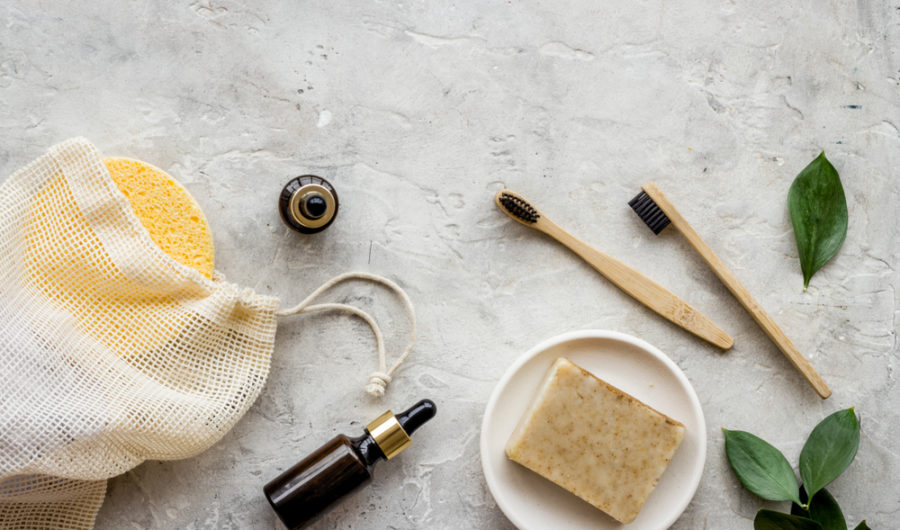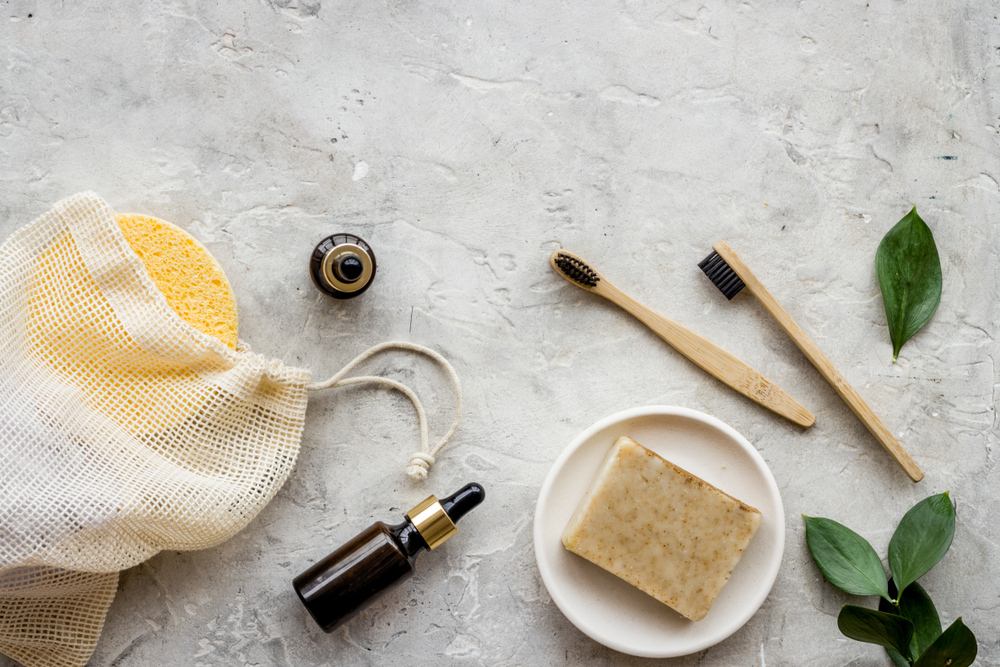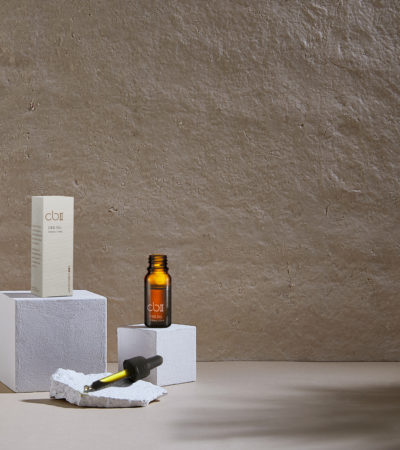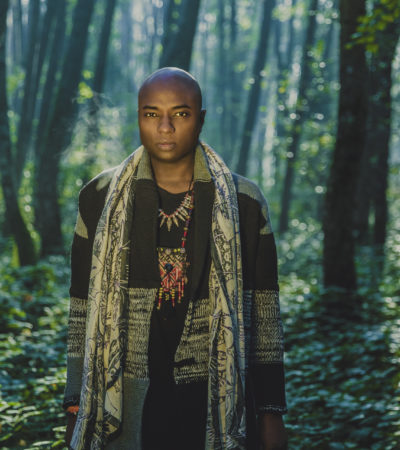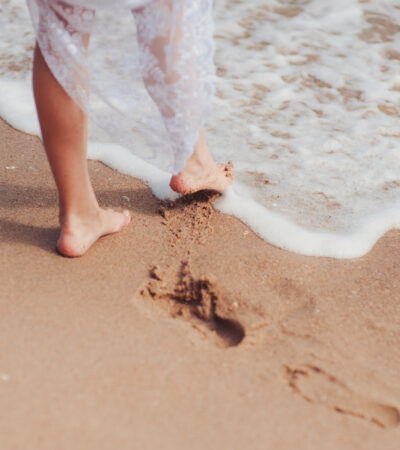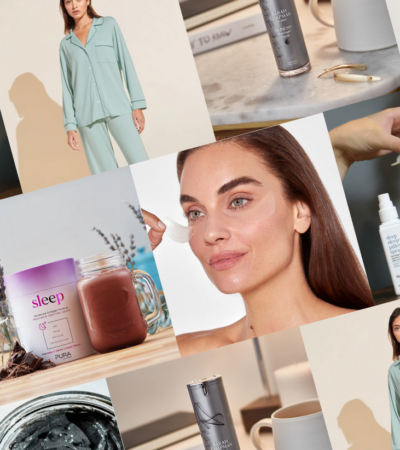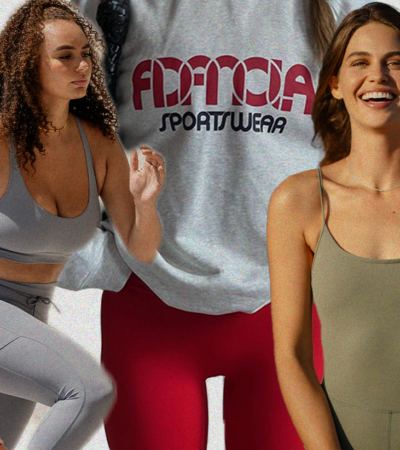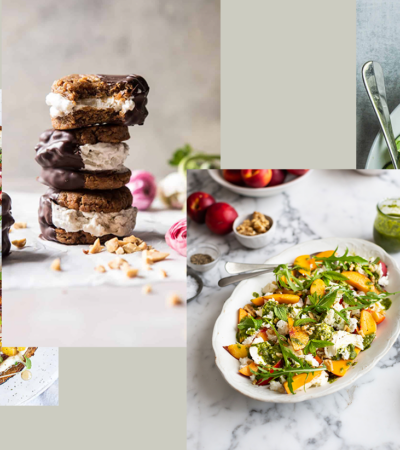A new year means new beauty trends, so while we bid farewell to the bizarre beauty moments of 2019 (glittery tooth polish anyone?), our focus is shifting onto packaging, personalisation and perfumes…From Beauty Minimalism To Waterless Wonders, discover the biggest clean beauty trends for 2020 as Hip & Healthy’s crystal ball (rose quartz, of course) reveals our top eight predictions for the year ahead.
Supercharged Sustainability
If there’s one thing that 2019 taught us, it’s that while recycling is crucial, it’s not enough. Tons of recyclable materials still end up in landfills and oceans, which is why the beauty industry is stepping up its packaging game with the introduction of more reusable, biodegradable and refillable products.
This year L’Occitane is aiming to save at least 170 tons of plastic by reducing plastic consumption, as well as offering in-store recycling services and eco-refills, which use 90% less plastic and lower CO2 emissions thanks to reduced transport. Olay has started testing refillable pods, and all of Dove’s brands have announced that their packaging will be made of completely recycled plastic by the end of the year.
More and more brands are participating in the TerraCycle programme too, which in the UK includes the likes of REN, Burt’s Bees, Deciem and Weleda. Not only will your products arrive in more eco-friendly packaging, but once you’re used them up, you send back your empties where they’re washed, refilled and sent out again.
Whether it’s investing in smart packaging, eliminating the need for it completely thanks to ‘naked’ products, or refilling your tubs and jars, 2020 is all about a new era of supercharged sustainability.
Beauty Minimalism
It’s not just packaging that’s getting a makeover, it’s our actual beauty routines too. Specifically, the number of products we’re using. This is good news for our bathroom shelves, the planet and our bank accounts…
Dubbed the “anti-excess” movement in the beauty blogosphere, this new minimalist movement is all about stripping things back, with the likes of YouTube star Samantha Ravndahl asking to be removed from PR lists completely while embarking on a three month “no-buy cleanse”. “I felt like I was producing a lot of waste”, she revealed on her channel.
Not only does using fewer products mean less waste and unnecessary expenditure, but it also means focusing on products that really work and offer more than one perfecting promise. So, it’s out with the 10-step SoKo routine (seriously, who has the time?) and in with the less is more approach. Finally.
Waterless Wonders
The World Wildlife Fund predicts that by 2025 two-thirds of the world’s population could face H20 shortages, so if there was ever a time to turn off the tap to water-filled beauty, it’s now. And whilst waterless products are already being championed by brands such as Lush and Pinch of Colour, the concept is making waves (excuse the pun) in the industry thanks to new developments in solid, powdered and dissolvable products, and formulas made sans aqua. So much so that even beauty giants like L’Oréal have pledged to reduce water usage by 60% this year.
Not only is this trend great for the globe, but it’s good news for skin too. No water means no preservatives, more concentrated formulas (read: you use less), and less chemicals and plastic packaging. It’s time to say no to H20 in your beauty bags.
CBD Everything
If you thought CBD beauty couldn’t get any bigger, think again – because 2020 is set to see cannabidiol take center stage. According to the British Beauty Council, Google searches for CBD skincare increased by a whopping 367% in 2019, proving that this trend isn’t going anywhere, anytime soon. And given its calming, healing and anti-inflammatory properties, it’s not hard to see why.
Beauty brands are packing their products full of the stuff, so whether it’s a CBD infused body oil, cannabis face mask, hemp hair hero or even a CBD packed mascara (yep, really) expect to see even more CBD beauty products hit the shelves this year.
Real Beauty’s Back
There’s no denying that the beauty world is more diverse than ever, with a growing number of brands embracing inclusivity at a time when 40 shades of beige no longer cuts it. But it’s not just skin colour (or the lack of it) that brands are being called out for, it’s also a lack of representation across the board.
Boundaries in beauty are finally being blurred or eliminated entirely as consumers call for gender-inclusivity, age acceptance and people who look like actual people. We’re talking less airbrushing and unachievable aesthetics and more realness. So, expect to see more gappy grins à la Gucci’s latest lipstick campaign, stretchmarks on show, un-airbrushed acne thanks to brands like Blume, women, men and non-binaries of all ages and races, and even some body hair thrown in for good measure. Because, let’s be honest, that’s what real beauty is all about.
Sustainable Scents
With the natural beauty market booming and calls for sustainable, organic and natural products at an all-time high, there’s one area that still has a long way to go: Fragrance. Just take a look at the ingredients label on your preferred perfume. Chances are you won’t be able to pronounce what goes into it, let alone decipher what each ingredient actually is…
Given that the average fragrance mixture contains several hundred chemicals, this poses some serious problems. Your perfume has the potential to emit the same number of chemical vapours as petrol emissions from your car, and these volatile organic compounds (VOCs) have been shown to react with proteins in our bodies to cause breathing problems, skin irritation, headaches, and even disrupt hormones.
While we’re all for smelling sublime, dousing ourselves in artificial chemicals? Not so much, which is why we’ll be stocking up on clean, natural and sustainable scents this year. With more and more brands offering safe and organic olfactory offerings, including Neom and Michelle Pfeiffer’s brand Henry Rose, smelling good while doing good couldn’t be easier.
Bespoke Beauty
The future of beauty? Personalised products, customisable routines and bespoke beauty brands. At a time when celebrating individuality is at the forefront of the industry, one size fits all is so last year.
Most mass-produced products target only one or two of our beauty concerns, which is why brands like Prose, who offers customised hair care products, and Curology, which is all about personalized skincare, are giving control back to consumers. Whether it’s via a fun online quiz, hi-tech mobile app, whizzy-skin reading devices or in-store consultations, you can now find the product best for you. Cue an army of mix-and-match offerings from everyone from Clinique and Kiehl’s to Neutrogena and SkinCeuticals.
You can even create your own lipstick tailored specifically to your skin tone at BITE Beauty’s Lip Labs, and over at Lancôme and Estée Lauder counters you can create a foundation tailored to your precise skin tone measurements. Could this be the return to consumer-centric, apothecary-style beauty? Only time will tell.
Sensitivity Reigns Supreme
While the idea of ‘skin types’ has gradually fallen by the wayside over the past few years, there is one that almost 70% of women now claim to have – sensitivity. According to a report conducted by P&G last year, this number is up by almost 20% and is sparking a rise in ‘gentle’, dryness diminishing products. This is linked to over-exfoliation, the use of too many products (hello minimalism), and harsh chemicals found in many products – which is why adult acne and eczema are also on the rise. We’ve said it once, and we’ll say it twice – strip it back.
words by Frankie Rozwadowska
Read more: Catch Some Zzzzzz With The Best Sleep Mists

